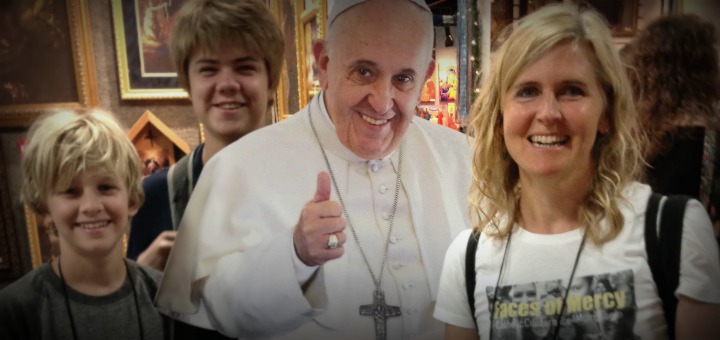 Copyright 2016 Tami Kiser. All rights reserved.
Copyright 2016 Tami Kiser. All rights reserved.
The Pope has spent the first week of March in retreat with members of the Roman Curia. They are being led by a retreat leader, Fr. Ermes Ronchi, of the Servants of Mary. Their spiritual exercises began with the contemplation of these 10 questions from the Gospels.
Slowly and intentionally meditating on just brief sections of the Gospel does wonders to pull us into the Gospel narrative and bring us into a deep relationship with Jesus. I decided to spend a few minutes each day contemplating what these questions could mean to a busy mother from South Carolina. Here I want to share a few of my insights and further questions and prayers to get you started on your own contemplations.
1.“What are you looking for?” (John 1:38)
This was the calling of 2 of the disciples who followed Jesus after John the Baptist told them, “Behold, the Lamb of God.” They went to Jesus and he asked them the question. The best response the disciples can come up with at this point is to ask Jesus where he is staying. Jesus says to them, “Come, and see.” What am I looking for? I do seem to always be looking for something—a better way to do this chore, a better way to save money, a better “activity” for the kids, chocolate, Pinterest. I am always looking. Dear Jesus, help me to look for you—even if I don’t quite know what to answer you when I find you.
2. “Why are you afraid? Do you still have no faith?” (Mark 4:40)
Jesus asks his disciples this upon them waking him up in a boat in a middle of a storm. Jesus rebukes the waves and says, “Be still.” The disciples seem terrified more that Jesus has such command over the waves and wind. “Why are you afraid? Do you still have no faith?” Unlike the disciples, I know the outcome of this story. I even know the outcome of the resurrection. What do I have to fear? God even knows the number of hairs on my head. Still, I am afraid. Here is what I fear most: the salvation of my children, serious sickness of family members, taking risks with money, and sharing the Gospel with close family members and acquaintances. Dear Jesus, help me to not to fear.
3. “You are the salt of the earth; but if the salt has become tasteless, how can it be made salty again?” (Matthew 5:13)
The answer to this rhetorical question is that it can’t. This is part of his Sermon on the Mount to crowds of people, including his disciples. So in this analogy, I am salt. What is salt for? It preserves food and gives it flavor. How can I preserve and flavor those around me? I think about my family. Dear Jesus, help me to be that steadfast anchor that my family members can always turn to when they are downcast, losing faith, losing hope. Help me to help others persevere. Keep me salty—full of attractive flavor.
4. “But who do you say that I am?” (Luke 9:20)
Jesus directly asks his disciples this question. They tell him what others are saying: John the Baptist, Elijah. But Peter jumps in with the great proclamation of faith: You are the Christ! Who do I say that you are, Jesus? Do I really think you are the Messiah, the Son of God, who has come to earth to save mankind? Do I really believe this? If I think this, why don’t I live differently? Dear Jesus, Help me to live my life like I really believe this.
5. “Then, turning to the woman, he told Simon, ‘Do you see this woman?’” (Luke 7:44)
The woman Jesus is asking Simon Peter about is a prostitute who used her tears to cleanse Jesus’s feet. The Pharisees are scandalized by Jesus for spending time with this woman. Jesus tells a short parable about two men who each owed a debt that was forgiven—one much bigger than the other. Jesus asked Simon which man would love the debt-forgiver more? Jesus was inferring that because the woman had much sin; she would love Jesus more. The question Jesus asks is: Do you see this woman? Do I see that woman? Do I see others fallen away from the church? Do I see others living in sin? Sure, I see these people all of the time and unfortunately, I view them more as the Pharisees do. Dear Jesus, Help me to see them as you see them, people with great potential to love.
6. “How many loaves do you have?” (Mark 6:38, Matthew 15:34)
Feeding the five thousand began with Jesus asking this question. How many loaves do I have? I take this to mean: what do I need to give Jesus? If I offer him what I have, he can take it, multiply it, and use it to his glory. Dear Jesus, Have I given you everything? What have I held back? Help me to see more clearly what I need to give to you. Help me to give it to you and then let go.
7. “Straightening up, Jesus said to her, ‘Woman, where are they? Did no one condemn you?’” (John 8:10)
Jesus had been drawing with a stick in the dirt while one by one the crowd left the woman who had been brought to Jesus to be stoned to death for her adulterous relationship. Soon the only ones left were Jesus and the terrified and ashamed woman. Where are the ones who were so quick to point out the sin in this woman’s life? When Jesus asks them to examine their life, they are no longer quick to condemn. Now instead they go away quietly. This question reminds us a lot of the woman from question number 5 who was unchaste. The difference here is that Jesus is asking us to probe our own sins. We cannot be quick to judge others when we too have fallen in so many ways. We can’t throw a stone at others when we have our own faults. Dear Jesus, please help me to see my own sins clearly and not to look for sin in others. Help me to work on these, particularly my sins of pride and impatience.
8. “Woman, why are you weeping? Whom are you seeking?” (John 20:15)
Mary Magdalene goes to the tomb. We can imagine the trauma and hurt she must have felt after seeing our Lord go through the crucifixion and dying. Now she thinks someone has taken the body. This is too much. More than she can bear. I’ve had many causes of suffering in my life—death of my mother, 2 stillborn infants, children with serious illnesses. I can imagine Mary Magdalene’s pain. I recently have lost 2 acquaintances around the same age as I am to cancer. I’ve seen their families go through this pain and loss. Suffering is unavoidable. We weep. Jesus asks us: Why are you weeping? We need to tell him. We need to weep right in Jesus’s arms. And that’s the answer to the next question: Whom are you seeking? We are seeking you, Jesus. When we weep, we need to seek Jesus. Dear Jesus, whether our sufferings are great or small, help us to seek you and weep in your arms.
9. “Simon, son of John, do you love me?” (John 21:16)
Jesus asks Simon Peter this question three times. Peter replies that he does. Jesus then follows up with the statement, “Then feed my sheep.” I like to substitute my name in this passage from the Scriptures, “Tami, do you love me?” This sounds like something a boyfriend or lover would ask a beloved. Yet as Christ is the Groom and we the Bride, how do we answer? We are to be in a relationship with Jesus. Sometimes Jesus is just a concept or religious idea that we “believe in” instead of a person we actually have a “relationship with.” No one tires of hearing that they are loved. This is why God created man to love and to be loved by him. Dear Jesus, I love you.
10. “Mary said to the angel, ‘How can this be?’” (Luke 1:34).
I like that the last question is not one from Jesus, but from Mary. I look over these other questions where we are asked to put it all on the line for Jesus—we are to trust him, give him everything, and finally to really love him. Even with the best intentions and meditations, this seems impossible. I ask myself, “How can this be?” From this passage in the Gospel, we get our answers: the Holy Spirit and the Power of God. Another answer that we can gather from the question is Mary herself. After this question and the angel’s answer, Mary gives her great fiat: Let it be done to me according to your word. We must give our own fiat. And not only do we have the Holy Spirit and the power of God to help us, we have Mary, herself. I wonder if this is why this question is last. Mary is not only the perfect example for us; she also will be our guide and advocate. Dear Mary, please help me to live my resolutions from these meditations. I know with God, all things are possible. Take these petitions and resolves and present them to your son. Amen.
Copyright 2016 Tami Kiser
About the Author

Tami Kiser
Tami Kiser is a wife, mother, teacher, author, and speaker. She runs a video production studio featuring Catholic speakers. These can be purchased or viewed on Formed. She also is the co-owner and host of a new Catholic Retreat and Cultural Center in the Carolina Mountains called Heart Ridge. She has taught everything from NFP, Zumba, cleaning toilets, Catholic crafting, the hula, bullet journaling, tap dancing, and liturgical living to Saxon Math 54 for the 10th time.


.png?width=1806&height=731&name=CatholicMom_hcfm_logo1_pos_871c_2728c%20(002).png)
Comments